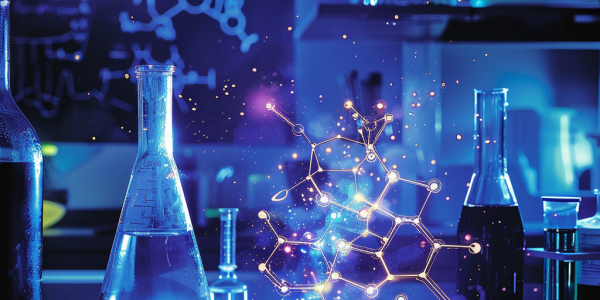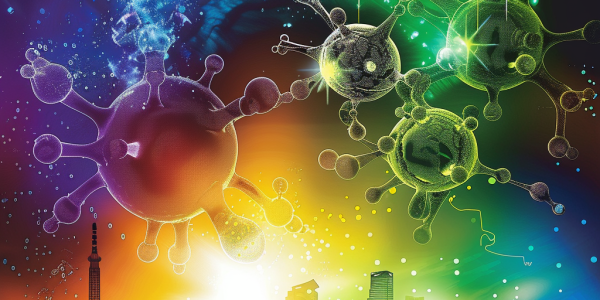Revolutionary Photocatalytic Method Transforms Furans into Pyrroles, Advancing Drug Discovery
A groundbreaking photocatalytic technique has been developed that efficiently converts furans into pyrroles, revolutionizing synthetic chemistry and drug discovery. This innovative method allows for atom exchange in a single step under milder conditions, overcoming the limitations of traditional methods. Researchers from South Korea have pioneered this approach, enhancing the practicality of furan-to-pyrrole conversions and potentially accelerating the development of new pharmaceuticals.
KAIST Researchers Unveil Novel Light-Driven Method for Atom Swapping in Aromatic Rings
Researchers at KAIST have unveiled a groundbreaking light-driven photocatalytic reaction that enables the replacement of oxygen atoms with nitrogen in five-membered aromatic rings. This innovative approach, published in Science, marks a significant advancement in atom-swapping reactions, with profound implications for medicinal chemistry and drug development.
Breakthrough Study Visualizes Nanoscale Water Generation, Paving Way for Innovative Solutions to Water Scarcity
Northwestern University researchers have made a groundbreaking discovery by observing nanosized water bubble formation in real time, shedding light on the catalytic process involving palladium. Published in the Proceedings of the National Academy of Sciences, this study has profound implications for water generation, especially in arid environments and space exploration, potentially revolutionizing resource management on Earth and beyond.
Aarhus University Researchers Develop LaKe Molecule to Mimic Exercise Benefits
Aarhus University researchers have unveiled LaKe, a revolutionary molecule that mimics the metabolic effects of exercise and fasting. This innovative compound could transform health and nutrition, offering significant benefits for those unable to maintain regular exercise routines. Current trials suggest LaKe may promote well-being and address neurological conditions, potentially becoming a key player in combating metabolic syndrome. Discover how LaKe could change the future of health supplements and improve quality of life.
Groundbreaking Discovery of Carbon-Carbon One-Electron σ-Bond
A groundbreaking study reveals direct evidence of a carbon-carbon one-electron σ-bond, a significant milestone in chemistry. This discovery, achieved through advanced techniques like X-ray diffraction and Raman spectroscopy, validates theoretical predictions and opens new avenues for research in chemical bonding and material development.
Breakthrough Method Detects CO2-Derived Oxidant in Human Cells
Recent research from the University of São Paulo reveals a groundbreaking method for detecting peroxymonocarbonate, a significant biological oxidant derived from carbon dioxide (CO2) in human cells. This study highlights the physiological effects of elevated CO2 levels, particularly in urban environments, and emphasizes the urgent need to understand CO2 toxicity mechanisms and their implications for human health.
Breakthrough in Hydrogen Isotope Separation Promises Sustainable Energy Advances
A groundbreaking study by Leipzig University and TU Dresden has advanced hydrogen isotope separation, crucial for sustainable energy. This research enables efficient, room-temperature separation of hydrogen isotopes, paving the way for innovations in fuel cells, nuclear fusion, and pharmaceuticals, marking a significant leap in the quest for clean energy solutions.
University of Michigan Develops Innovative Artificial Photosynthesis System for Sustainable Ethylene Production
Researchers at the University of Michigan have developed a groundbreaking artificial photosynthesis system that efficiently converts carbon dioxide into ethylene, a key hydrocarbon used in plastics. This innovative approach significantly reduces CO2 emissions compared to traditional methods, paving the way for sustainable fuel alternatives and addressing climate change. The system’s efficiency is five to six times greater than conventional solar energy methods, representing a major leap in sustainable energy solutions.
Revolutionizing Chemical Processes: The Promise of Liquid Metals
Researchers at the University of Sydney are pioneering the use of liquid metals to revolutionize chemical processes, aiming to reduce industrial emissions and energy consumption. This innovative approach could transform the chemical manufacturing landscape, addressing a significant contributor to global greenhouse gas emissions. Discover how this groundbreaking research could pave the way for greener and more sustainable chemical reactions.
New Research Unveils Groundbreaking Insights into Earth’s Ancient Mantle
Recent research from the Smithsonian’s National Museum of Natural History reveals groundbreaking insights into Earth’s geological history through the study of 2.5 billion-year-old ‘time capsule’ rocks. These findings challenge long-held beliefs about the oxidation state of the Earth’s mantle, suggesting stability over geological time. This research not only enhances our understanding of Earth’s early processes but also connects to the broader narrative of life’s origins on our planet.










